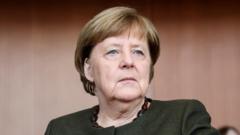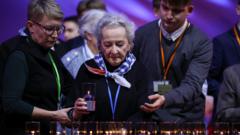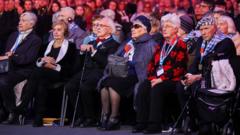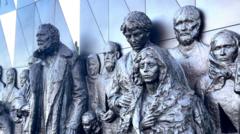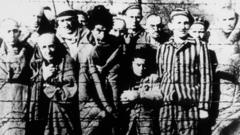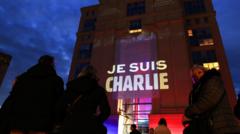**As France grapples with political tensions, the memory of Le Pen reignites divisive debates, echoing the shifting landscape of the National Rally's influence.**
**Political Strife in France: A Nation Divided**

**Political Strife in France: A Nation Divided**
**Amidst mourning, controversies arise surrounding the legacy of far-right figure Jean-Marie Le Pen.**
Hundreds gathered at Val-de-Grâce church in Paris this Thursday to remember Jean-Marie Le Pen, the controversial far-right founder, who passed away on January 7 at the age of 96. The ceremony stirred mixed emotions as attendees reflected on his polarizing legacy defined by racist and antisemitic rhetoric.
During the requiem Mass, tributes poured in. One speaker commended Le Pen for allegedly foreseeing current threats facing France, while a choir passionately performed a French military hymn requesting divine support in battle. Echoes of prayer for Joan of Arc resonated among mourners with a plea to preserve France's Christian identity.
However, haunting questions regarding Le Pen's controversial past arose. His historical minimization of Holocaust atrocities and dismissal of the German occupation's severity sparked fierce debates about whether he should be revered or reviled in death. This discourse mirrors the broader societal and political rift concerning Le Pen's co-founded party, the National Rally, which has transitioned from a fringe movement to a significant player in contemporary French politics, holding the most seats in the National Assembly.
Despite their substantial political gains, National Rally leaders express frustration over their persistent exclusion from formal political respect and influence. François Rebsamen, a leftist minister, starkly stated in a recent interview that he respects all political entities "except the National Rally," underscoring the profound contempt still directed toward the party and its ideals.
As reflections on Le Pen's life and the fate of his political legacy unfold, French society stands at a crossroads, caught between the allure of radical ideologies and the quest for unity in an increasingly fragmented landscape.
During the requiem Mass, tributes poured in. One speaker commended Le Pen for allegedly foreseeing current threats facing France, while a choir passionately performed a French military hymn requesting divine support in battle. Echoes of prayer for Joan of Arc resonated among mourners with a plea to preserve France's Christian identity.
However, haunting questions regarding Le Pen's controversial past arose. His historical minimization of Holocaust atrocities and dismissal of the German occupation's severity sparked fierce debates about whether he should be revered or reviled in death. This discourse mirrors the broader societal and political rift concerning Le Pen's co-founded party, the National Rally, which has transitioned from a fringe movement to a significant player in contemporary French politics, holding the most seats in the National Assembly.
Despite their substantial political gains, National Rally leaders express frustration over their persistent exclusion from formal political respect and influence. François Rebsamen, a leftist minister, starkly stated in a recent interview that he respects all political entities "except the National Rally," underscoring the profound contempt still directed toward the party and its ideals.
As reflections on Le Pen's life and the fate of his political legacy unfold, French society stands at a crossroads, caught between the allure of radical ideologies and the quest for unity in an increasingly fragmented landscape.

